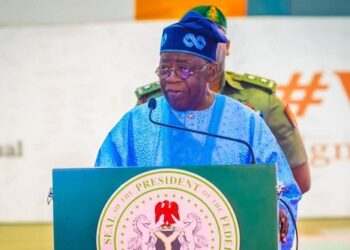Yemi Osinbajo, acting President on Thursday said the different arms of government must stop the ‘finger pointing’ as to who is the most corrupt and find a solution to the problem.
This is even as the Chief Justice of Nigeria (CJN) Walter Onnoghen blamed shoddy investigations by anti-graft agencies for the delay of justice and not corruption. He also said wherever impunity thrived corruption was bound to tag along.
Both were speaking at the ongoing corruption dialogue held at the banquet hall of the presidential villa on Thursday.
The United Kingdom through the Department for International also announced 20million British pounds support for the anti graft war in Nigeria.
After listening to the speech of the Chairman of the Presidential Advisory Council on Anti Corruption (PACAC), Itsey Sagay who alleged that corruption was thriving in many agencies of government despite the ongoing anti graft war and different other speakers who responded to counter the allegations, Osinbajo said it was high time the blame
trading and finger pointing stopped.
“So, I think we should leave the finger pointing, because the finger pointing is unhelpful. What is important is that we recognise that there is a major problem here.
“What I’d like us to do if that is possible in the course of this dialogue, is to look at models that have worked elsewhere and to see whether these models are somewhat applicable here .To look at best practices. The truth of the matter is that there is nothing peculiar about the Nigerian citizen, or the Nigerian type.
“Corruption thrives where it is allowed to thrive and there are many societies that have found themselves in worse circumstances than Nigeria and have somehow managed to solve their problems” he said.
Osinbajo also recommended that the stakeholders at the dialogue look at different models that have solved the issue of corruption and apply it to the Nigerian situation.In the fight against corruption he recommended the adoption of some best practices which included ensuring integrity in the entire justice system, looking at the general welfare of judges, investigation and prosecution of judges accused of infractions and the collaboration of the Executive,
Legislature and the judiciary to ensure the entrenchment of workable models.
Earlier, Onnoghen pointed out that shoddy investigations and prosecution by the executive often leave judicial officers and judges handicapped in dispensing justice in several high profile cases of fraud, terrorism and others, many of which have even been abandoned.
Onnoghen lamented that the Nigerian judiciary is being demonised because it is unfairly perceived as an epitome of corruption considering that all other arms of government are equally complicit.
Stressing that he did not intend to make excuses for bad eggs, the CJN argued that there are still many gentlemen as judicial officials who should be given the benefit of doubt by reporting allegations against them to appropriate quarters for investigation and possible sanction rather than clamping down on them in a brazenly illegal and unfair
manner.
Onnoghen declared that while the judiciary remains committed to and supports government’s efforts at curbing corruption, the efforts would fare better if government also tackles the cultures of impunity and
adheres to the rule of law.
“The Judiciary finds itself battered left right and centre. What can I say that will not appear as defending the judiciary or defending bad eggs?. But I assure Nigerians that the judiciary remains commuted to and supports government’s efforts at curbing corruption in Nigeria. To fight corruption we must fight cultures of impunity and adhere to rule of law.
“It is not fair to see judiciary as epitome of corruption. We have gentlemen on the bench. They are meant to be seen not heard. And can hardly defend themselves. We should channel grievances against them to proper quarters, not right to destroy the institution.
“Shoddily investigated and poorly prosecuted cases, and you still expert judicial officers to deliver justice? Hardly.
“Most cases of high profile fraud, terrorism, etc have been abandoned.
That is what I get from statistics across the country” he said.
The National Assembly also responded to Sagay’s allegation of corruption urging the PACAC not to support extra-legal activities like the sting operation carried out on judges.
Senate President Bukola Saraki, represented by Senator Chukwuka Utazi said it had now become the habit of certain agencies to refer to the national assembly as a den of corruption. He also reacted to the sting operation carried out by the Department of State Service (DSS) stating that PACAC must not continue to smear institutions of government.
“Certain government agencies and civil society bodies (and PACAC is not innocent of this), have formed the habit of making a scape goat of the National Assembly as a den of corruption. They deliberately cast institutions of state in unsalutary hue that is divorced from reality.
It does not help in confidence building, within government and across the civil population, when institutions of state are deliberately demonised in order to put the shine on others.
“In the same vein, PACAC should not lend itself to supporting extra-legal actions, if the fight against corruption will be sustained and ingrained in the body polity. A situation where PACAC speaks in favour of patently extra-legal means of law enforcement does not bode well for the rule of law. The end-result of any action of government
is as important as the process. The platforms for fighting corruption should not, themselves, be corrupt or be seen to be corrupted.
“The recent so-called sting operation by the Department of State Security on the residences of some very Senior Justices, some without warrants, others without any proof of incriminating body of evidence, leaves much to be desired” he said.
This is even as the Chief Justice of Nigeria (CJN) Walter Onnoghen blamed shoddy investigations by anti-graft agencies for the delay of justice and not corruption. He also said wherever impunity thrived corruption was bound to tag along.
Both were speaking at the ongoing corruption dialogue held at the banquet hall of the presidential villa on Thursday.
The United Kingdom through the Department for International also announced 20million British pounds support for the anti graft war in Nigeria.
After listening to the speech of the Chairman of the Presidential Advisory Council on Anti Corruption (PACAC), Itsey Sagay who alleged that corruption was thriving in many agencies of government despite the ongoing anti graft war and different other speakers who responded to counter the allegations, Osinbajo said it was high time the blame
trading and finger pointing stopped.
“So, I think we should leave the finger pointing, because the finger pointing is unhelpful. What is important is that we recognise that there is a major problem here.
“What I’d like us to do if that is possible in the course of this dialogue, is to look at models that have worked elsewhere and to see whether these models are somewhat applicable here .To look at best practices. The truth of the matter is that there is nothing peculiar about the Nigerian citizen, or the Nigerian type.
“Corruption thrives where it is allowed to thrive and there are many societies that have found themselves in worse circumstances than Nigeria and have somehow managed to solve their problems” he said.
Osinbajo also recommended that the stakeholders at the dialogue look at different models that have solved the issue of corruption and apply it to the Nigerian situation.In the fight against corruption he recommended the adoption of some best practices which included ensuring integrity in the entire justice system, looking at the general welfare of judges, investigation and prosecution of judges accused of infractions and the collaboration of the Executive,
Legislature and the judiciary to ensure the entrenchment of workable models.
Earlier, Onnoghen pointed out that shoddy investigations and prosecution by the executive often leave judicial officers and judges handicapped in dispensing justice in several high profile cases of fraud, terrorism and others, many of which have even been abandoned.
Onnoghen lamented that the Nigerian judiciary is being demonised because it is unfairly perceived as an epitome of corruption considering that all other arms of government are equally complicit.
Stressing that he did not intend to make excuses for bad eggs, the CJN argued that there are still many gentlemen as judicial officials who should be given the benefit of doubt by reporting allegations against them to appropriate quarters for investigation and possible sanction rather than clamping down on them in a brazenly illegal and unfair
manner.
Onnoghen declared that while the judiciary remains committed to and supports government’s efforts at curbing corruption, the efforts would fare better if government also tackles the cultures of impunity and
adheres to the rule of law.
“The Judiciary finds itself battered left right and centre. What can I say that will not appear as defending the judiciary or defending bad eggs?. But I assure Nigerians that the judiciary remains commuted to and supports government’s efforts at curbing corruption in Nigeria. To fight corruption we must fight cultures of impunity and adhere to rule of law.
“It is not fair to see judiciary as epitome of corruption. We have gentlemen on the bench. They are meant to be seen not heard. And can hardly defend themselves. We should channel grievances against them to proper quarters, not right to destroy the institution.
“Shoddily investigated and poorly prosecuted cases, and you still expert judicial officers to deliver justice? Hardly.
“Most cases of high profile fraud, terrorism, etc have been abandoned.
That is what I get from statistics across the country” he said.
The National Assembly also responded to Sagay’s allegation of corruption urging the PACAC not to support extra-legal activities like the sting operation carried out on judges.
Senate President Bukola Saraki, represented by Senator Chukwuka Utazi said it had now become the habit of certain agencies to refer to the national assembly as a den of corruption. He also reacted to the sting operation carried out by the Department of State Service (DSS) stating that PACAC must not continue to smear institutions of government.
“Certain government agencies and civil society bodies (and PACAC is not innocent of this), have formed the habit of making a scape goat of the National Assembly as a den of corruption. They deliberately cast institutions of state in unsalutary hue that is divorced from reality.
It does not help in confidence building, within government and across the civil population, when institutions of state are deliberately demonised in order to put the shine on others.
“In the same vein, PACAC should not lend itself to supporting extra-legal actions, if the fight against corruption will be sustained and ingrained in the body polity. A situation where PACAC speaks in favour of patently extra-legal means of law enforcement does not bode well for the rule of law. The end-result of any action of government
is as important as the process. The platforms for fighting corruption should not, themselves, be corrupt or be seen to be corrupted.
“The recent so-called sting operation by the Department of State Security on the residences of some very Senior Justices, some without warrants, others without any proof of incriminating body of evidence, leaves much to be desired” he said.









